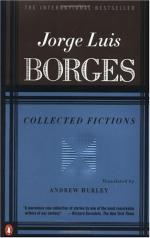
|
| Name: _________________________ | Period: ___________________ |
This test consists of 5 short answer questions, 10 short essay questions, and 1 (of 3) essay topics.
Short Answer Questions
1. In "A Weary Man's Utopia," in what language does the narrator speak to the man from the future?
2. In "Delia Elena San Marco," what does the narrator wonder after the death of his beloved?
3. In "The Bribe," what does Dr. Winthrop have to do?
4. In "Ulrikke," what happens between the narrator and Ulrikke?
5. In "The Disk," what god is associated with the disk?
Short Essay Questions
1. In "Everything and Nothing," who ultimately tells Shakespeare he is like him, and why does he say this?
2. In "The Duel," what is the nature of the duel between Clara and Marta?
3. In "The Interloper," do the Nelson brothers have any redeeming qualities?
4. In "The Ethnographer," why won't Fred Murdock reveal the secret of the Indian tribe to the professor?
5. Name some of the customs and beliefs of the strange group in "The Sect of Thirty."
6. In "Undr," is there any suggestion that "Undr" or "wonder" really isn't the only sacred word of the Urns?
7. Is there a contradiction to the argument in "Argumentum Ornithologicum"?
8. What does "Shakespeare's Memory" say about creating art?
9. What does "The Disk" say about greed?
10. In "The Rose of Paracelsus," why doesn't Paracelsus turn the ashes of the rose into a rose for the young man?
Essay Topics
Write an essay for ONE of the following topics:
Essay Topic 1
Labyrinths are included in many of Borges' stories. Indeed, "Labyrinths" is the title of one of his collections of stories. How are these physical structures significant to his work? Consider the essence of a labyrinth: a series of mazes, designed to confuse and entrap men. How do labyrinths fit into the stories themselves? How are labyrinths symbolic for Borges' artistic intentions? Be sure to cite specific stories in your answer.
Essay Topic 2
In "The Circular Ruins," a man dreams a son into existence. At the end of the story, the man discovers that he was likewise the creation of someone's dream. How does this story reflect Idealist philosophy, where reality is based on thought and the mind? What does the story say about Borges' view toward his own literary creations? Does it suggest a possibility about all of our lives? Note and explain at least one other story, in addition to "The Circular Ruins," that also reflects Idealist philosophy.
Essay Topic 3
Describe the style of Borges. Is it spare? Baroque? Academic? Opaque? Etc. Think, for instance, of "The Approach to Al Mu'tasim," which is written as a book review of the book "The Approach to Al Mu'tasim." Is his style mostly consistent throughout his stories, or are there any significant changes? Is his style appropriate for his subjects? Does his style itself often mirror the themes of the stories? Use at least three different stories to illustrate your point .
|
This section contains 1,176 words (approx. 4 pages at 300 words per page) |

|




